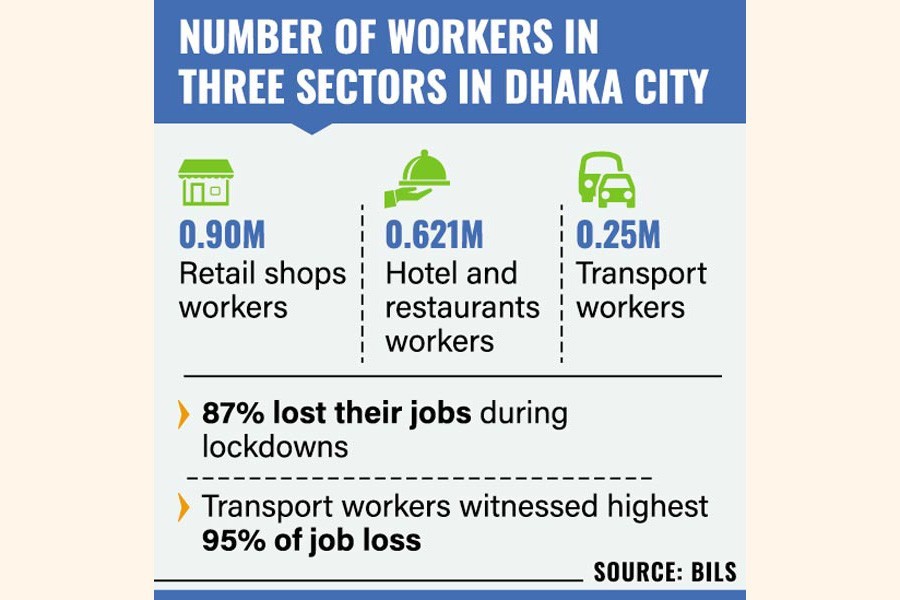
Published :
Updated :

Only 3.0 per cent of Dhaka's private-sector workers laid off during the corona onslaught could benefit from the Tk 1.28-trillion recovery packages, says a survey that found delivery disarray.
A think-tank that conducted the survey suggests introducing an emergency humanitarian assistance programme for private-sector workers in its ten-point recommendation, so as to help out the down-and-outs during such crisis.
Nearly 1.8 million private-sector workers lost 81 per cent of their earning during the lockdowns in 2020 and 21 in Dhaka city, leaving them worst-affected during the Covid-induced shuts, says the survey report published Thursday.
And only 3.0 per cent of them got help from the government-declared recovery programmes worth Tk 1.28 trillion, says the report titled 'Study on the Status of Social Protection and Job Security of Private-sector Workers: Experiences amid Covid-19 Pandemic and Way Forward'.
Bangladesh Institute of Labour Studies (BILS) revealed the findings in the report which says nearly 1.8 million transport workers, retail shop workers and hotel-restaurant workers remained three worst-affected groups during the lockdowns amid the pandemic for losing jobs or working hours.
"Above 7 per cent of them are still unemployed during this recovery since August 2021 while income of the workers shrank 8.0 per cent from the pre-pandemic level," says the report.
Deputy Director of BILS Monirul Islam presented the paper at a press conference held at BILS' office in the city, which also said most of the families' monthly expenditure had to be cut down by 77 per cent during the lockdowns for losing jobs or squeeze in income.
The report was prepared interviewing 400 workers in Dhaka city between September and November 2021.
The report mentions that the government implemented 23 recovery packages worth Tk 1.28 trillion (4.2 per cent of the GDP) to protect industry people and economy but hardly any workers from the three sectors were covered.
"Most, particularly employment security, income security and social security, were affected most by the lockdowns as an aggregated 87 per cent of workers became jobless during the period," says the report.
Transport workers were worst hit among them as 95 per cent lost job in the sector during the period, according to the report. Workdays got reduced by 85 per cent on average in the three sectors.
"Meanwhile, the affected workers fell in new trap during this recovery period after August 2021, as now employers are forcing workers to work extra hours, even in off-days, in breach of the labour law," says the report.
The BILS-placed ten-point recommendation includes preparing a complete database for private-sector workers, issuing ID cards mentioning proper occupation under the database.
It places special focus on the need for introducing an emergency humanitarian assistance recipe for the private workers, including assistance support and emergency food assistance, within the framework through forming a special fund.
A just and effective institutional framework with a core responsibility with the Department of Labour (DoL) should be established.
A legal amendment should be done to enable 'the Labour Welfare Foundation' to hand out cash assistance to the private-sector workers.
BILS also recommends ration, vaccination, unemployment benefits and insurance for the private-sector workers to tackle such humanitarian predicament.
Its vice-chairman Md Amirul Hoque Amin, and directors Kohinoor Mahmud and Nazma Yasmin also spoke, among others.
tonmoy.wardad@gmail.com


 For all latest news, follow The Financial Express Google News channel.
For all latest news, follow The Financial Express Google News channel.